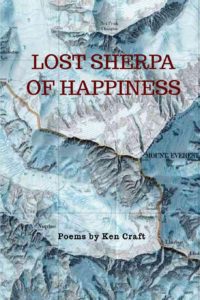
It’s not every day you track down a lost sherpa (if briefly). Not every day he agrees to pause for a brief interview, either. But yesterday, in single-digit weather, with wind gusts making it feel like sub-zero weather, LS did just that. As I learned a thing or two about poetry (or “life,” as he’d prefer you call it), I figured I’d share the back-and-forth:
KC: Why are you called the “Lost Sherpa of Happiness”? I mean, are you really lost?
LS: Not me. We.
KC: All lost?
LS: Look at the stars tonight, which are only the beginning, and consider your place here. What you know. What you don’t know. Does it seem disconcerting to be considered lost?
KC: Some readers of the book look at the cover and think the collection will be about Nepal or summiting Mount Everest or Buddhism, perhaps. Why does the book carry that title and that artwork?
LS: You have to stop thinking of the challenge we call “Everest” and the guidance we call “sherpa” as a place and a person. Then you will see that all the poems in this book are about “Everests” of a kind — challenges, obstacles, frustrations. The figurative mountains you’d see around you, if you looked, Nepal or not.
KC: But you yourself are only in one poem. The title poem that wraps the book up.
LS: I am both reader and writer as well. Therefore, I am in every poem. Reading and writing are all ways of walking, searching, observing. Sometimes choosing to question and more times choosing not to.
KC: What about section two of the book’s three parts–all animal poems. Is there a reason for this?
LS: It is a human propensity to box and label things, to demand order from our disorderly world. Yes, it’s true that the “Second Search” poems tell the stories of various birds and mammals and reptiles, but those stories are our stories. We are animals. We are that song sparrow singing, despite the hawk far above in the pine tree. We are that young raccoon trapped in a dumpster after enjoying someone’s thrown-away food. We are that dog just being a dog in a room with humans who demand silence from a dog not being a dog. As your American writer, Mark Twain, once said, humans are often less logical animals than the ones they feel superior to.
KC: What about the first search, the part where many poem’s recall your youth?
LS: Or your youth. Or any reader’s. As youths, we are often wiser than the elders. The nonconformism. The imagination. The openness and the wonder. Poems see this because, as has been said by the Buddha himself, we are all poets when we are children. Not writers of poetry. Observers of a world that is poetry. We look at things like we never could as adults who have been shaped by society, pressed by authority, molded by the tyranny of others’ opinions and demands and expectations.
KC: So I guess that means the last section is really not so much about twilight years…
LS: True. Life as wheel. The way the elderly finally free themselves of caring, becoming more open like the children they once were, preparing themselves for their next life, for freedom from samsara.
KC: Does this mean you are not lost, then?
LS: It means I am happy, and that “lost” is more word than state of being. There is great joy and discovery in being “lost.” That is the country these poems travel — “country” as in land, not nation with arbitrary borders (which, by their nature, can’t help but be arbitrary).
KC: Do you have a favorite among the poems in the book?
LS: Picking favorites would be like claiming individualism does not exist. It does exist. There are many faces to happiness, to sadness and to regret. All the human emotions we see on our journeys and searches.
KC: So, I gather, you have no intention of being found or finding what you’re looking for.
LS: In the words of the prophet, Bono (an Irish Buddha of sorts!), “I still haven’t found what I’m looking for…” We all carry those words in our hearts. It’s how we interpret them. I embrace the negative contraction positively because it is the spirit of the present. Finding, searching, being lost. It is being. How else will we ever enjoy this “tenuous moment of wilderness,” as the last poem of the book terms it, called life?
KC: Thank you, and I won’t keep you any longer. Good luck with your fourth search. And thank you for sharing your pursuit of happiness in this book.
LS: (laughter) Thomas Jefferson. The pursuit of happiness. It is the pursuit itself, not the happiness you imagine ahead and out of reach. Take that with you on your own searches. See what you find….
*************************************************************************
Unlike major publishing houses, small, independent publishers have no marketing budget to speak of, so they depend upon word-of-mouth enthusiasm among their readers. Help keep the word-of-mouth buzz rolling for Lost Sherpa of Happiness by visiting Amazon for a copy.




